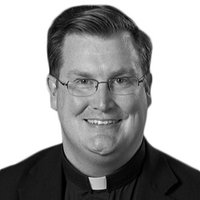They say if you don’t like the weather in Michigan, just wait 10 minutes and it will change. October is one of those months in which it seems like any season can make an appearance, and sometimes it can feel like two or three seasons in a single day.
Sometimes our lives can feel like this as well, seeming to change in an instant. Our health, our financial security, our relationships, can all change for the better or for the worse much more quickly than we would like. In this high-tech age, it seems like all of life is moving in fast-forward. And while that can be exciting, it can also produce a lot of anxiety.
Pope Benedict XVI was speaking to a assembly of bishops several years ago and offered an important insight about how to overcome this kind of anxiety. Comparing the worldly things we can so easily become focused on with God’s Word, he said: “And all these things, which seem like the true reality on which we can count, are realities of a second order. One who builds his life on these realities, on objects, success, on everything that’s visible, builds on sand. Only the Word of God is the foundation of every reality, fixed as the heavens and more than the heavens, is the reality.”
Here Pope Benedict was referring to the end of Jesus’ Sermon on the Mount, where Jesus makes clear the stakes involved in following His teachings. We cannot sit on the fence. We are either people of Christ, or people of the world. We are called to be people of Christ in the world, but we cannot be worldly people. To be people of Christ is to build our lives on a solid foundation, not subject to the storms and shifting fortunes of life in this world. People of the world rely on something that is simply unable to support them — an empty promise.
Our lives need to be clearly built upon the rock foundation of Jesus Christ, so that the challenges we face and concern about the future do not rob us of what is of eternal value: our union with God, with His Church, and with each other. There is, of course, a legitimate concern we have for external things, such as financial resources or our health, especially when we have other people to take care of. But we can’t let that concern morph into the kind of fear that undercuts God’s place at the center of our lives.
Here we can look to St. Paul as a heroic model. In his Letter to the Philippians, St. Paul writes, “Brothers and sisters: I know how to live in humble circumstances; I know also how to live with abundance. In every circumstance and in all things, I have learned the secret of being well fed and of going hungry, of living in abundance and of being in need.”
How many of us can say the same? How many of us have ever had to go hungry? If we have had to do without, how many of us have truly been gracious about it, continuing to recognize the many gifts of God? Perhaps many of us, but I bet there are also many of us who have a lot to learn about these things.
Sometimes we are forced to experience hard times, but we can’t be forced to learn how to deal with hard times graciously. We need to choose to learn this lesson and to live accordingly.
One of my favorite TV shows over the years has been Little House on the Prairie. It’s a great family show, in which you inevitably laugh, you cry, and you learn a lesson. The show did an excellent job showing how a family can handle tough times graciously, keep their faith, stick together as a family, and refuse to give in to despair, despite the intense challenges of pioneering life.
We might not live on the prairie, but life today has plenty of challenges. From the continuing attacks against moral living, attacks upon the dignity and sanctity of human life, to the ongoing COVID-19 threat, the uncertainties of our economy, and all kinds of world problems brought to us constantly by the news and social media, we have a lot we could worry about.
With every challenge, there also comes an opportunity to examine the whole way we look at life. Do I let any worldly anxieties dominate my thoughts, my hopes, my decisions? Do I keep my focus on Christ even when times get tough? The key is to allow faith, and not fear, to be our motivation.
When we fear for our physical or material well being, we are prone to make bad decisions. When we have faith, we are prone to make godly decisions. For example, how often has it been the case that money problems have been a catalyst for the disintegration of marriages and families? Faith tells us that people are more important than things — and that these are more than nice words! Faith motivates us to persevere in doing the right thing even when the wrong things are happening to us.
“I can do all things in him who strengthens me.” St. Paul didn’t just write these words, he lived them with every fiber of his being, until the day he was killed in Rome for his faith in Jesus Christ. St. Paul rejoiced to share in the cross of Christ because he kept his focus always on Jesus. He ate and drank Christ’s Body and Blood at every Mass and gained the strength to meet every challenge that came his way.
Christ gives Himself to us in every Holy Mass, just as He gave Himself to St. Paul. In Christ, we have the strength needed to keep going through life’s challenges, focused on Him alone, totally committed to doing His holy will.
Fr. Charles Fox is vice rector and dean of seminarian formation at Sacred Heart Major Seminary in Detroit. He holds an S.T.D. in dogmatic theology from the Pontifical University of St. Thomas Aquinas (Angelicum), Rome.












